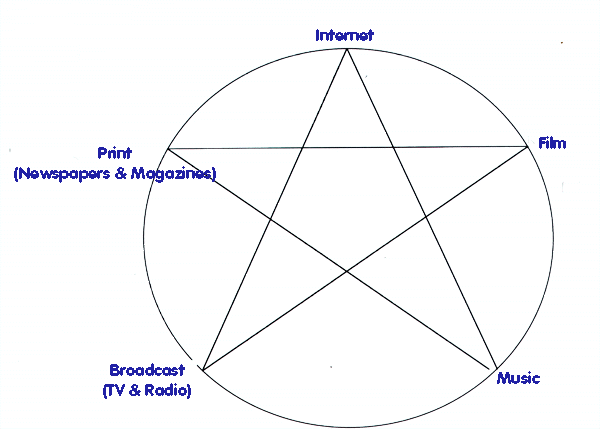Institution
Institutions are (according to Key Concepts in Communication by O'Sullivan, Fiske, Hartley & Saunders 1983)
'School' is a major institution, as is 'home', and if you are thinking purely theoretically, you can consider things such as 'knowledge' or 'language' to be institutions, containing as they do a whole set of rules and codes which 'constrain and control' our lives.
In Media Studies, we are most concerned with the institutions responsible for producing media texts. They can be represented by the following diagram:

Therefore we can refer to "The Press" or "TV" and have a general awareness of the values and codes of a) what is produced and b) the producers. For instance, we think of journalists, regardless of politics and rightly or wrongly, as sharing the same set of values as their newspapers. We know what a newspaper is and how it behaves. We see 'Newspapers' as something bigger than, and probably more authoritative/powerful than us as individuals.
However, as global patterns of ownership change, so does the concept of Institution. Media ownership is now concentrated in the hands of a few companies worldwide, and these companies own examples of many different media. So, it is true to say that the 'Institutional Values' of, say, Disney, are reflected in a number of different media companies that they own (e.g. Marvel Studios, the Discovery Channel), which can therefore be grouped together and considered as part of the same institution (the Disney Corporation).
Basically, understanding institution is about understanding
- who produces media texts
- what their set of codes and values is
- and their relationship to us as individuals
Global Corporations
Here are the URLS which will help you track the activities of the global media corporations. Some of them are very open about the links between their operating sectors. Some are not. Check out the investors information they provide in order to get a clear picture of exactly how huge a slice of the global media these companies own.
US organisation, Free Press, keeps track of the 'Big Six' ownership patterns in this handy chart.
For an independent viewpoint of their activities, and a comprehensive roundup of news stories regarding global conglomerates, try Corpwatch, AdBusters or Source Watch. As a media student, you should understand the complexities of the cross-ownership debate: keep your eyes on those news stories and follow the latest developments. These stories affect you and the news you have access to. Keep up with the latest at the Mediaknowall blog.
Independent
Is there any such thing? How do you define it? Can truly independent media companies (i.e. those that have absolutely no connection with the above corporations, including their distribution channels) exist and find an audience? Does they have a function in our global village? Is access to independent media a fundamental human right? There are many important issues surrounding the existence of a 'free' media. Unfortunately, the media organisations describing themselves as such are frequently invisible, strapped for cash, and squeezed out of the market by larger corporations or hostile governments. Independence is a political, as well as a financial attitude.
Investigate some of these sites for yourself. Most of them are American.
Independent Newspapers/Magazines
Apart from the wealth of webzines online, you could look at some of the longer-established independent press
Audio-visual
Many independent media organisations now combine technologies and resources.
